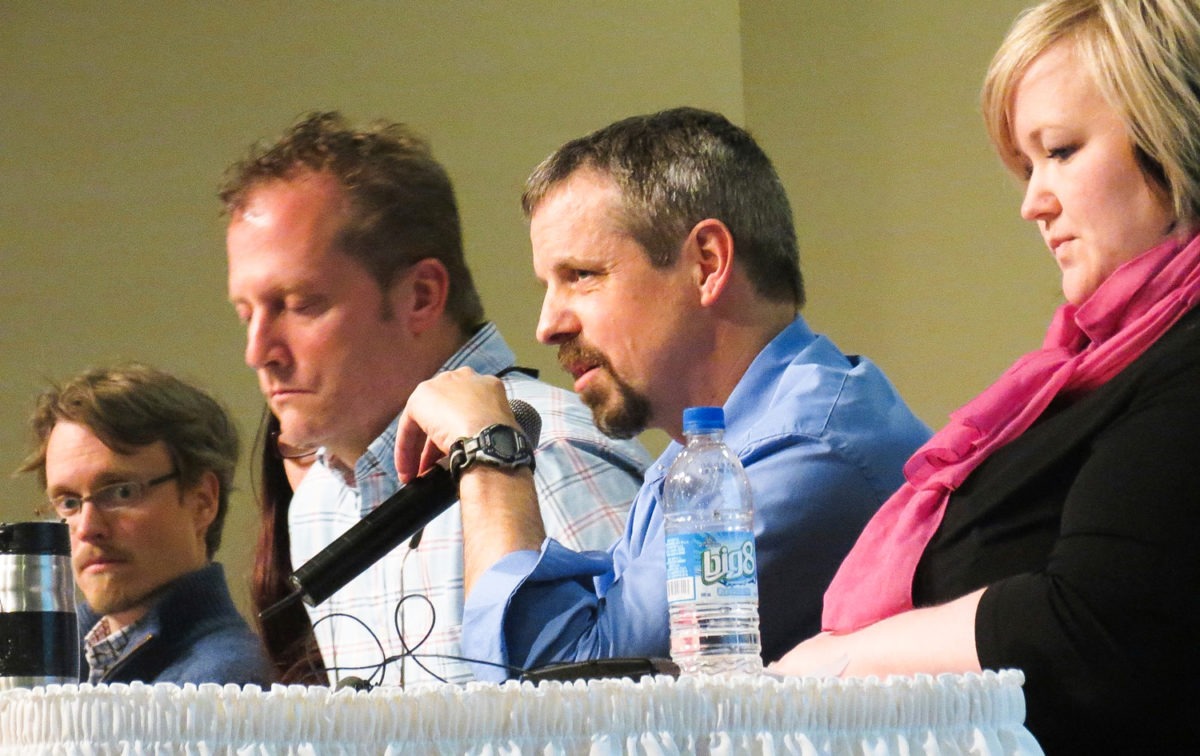
last week (Amanda Jess/AQ)
Academics and health service providers at a panel held April 4 at St. Thomas University questioned the over-representation of alcohol as a factor in sexual assaults in a poster campaign made by New Brunswick College of Craft and Design students.
Although the panelists were pleased with the project, many said there were still areas that could be improved.
Karla O’Regan, an associate professor in the criminology department at STU, said sexual assaults while women are unconscious happen, but not as often as miscommunications between people that trusted each other.
“These are in some instances outliers and they’re easy for us to target and say, ‘That’s wrong.’ And it’s the more ambiguous cases that contribute to a cultural understanding that allows these instances to occur.”
O’Regan said it’s lacking in the unfortunate reality of sexual assault within relationships, whether it’s with two partners together for years or good friends. She also said it didn’t show any same sex couples.
Rice Fuller, director of counseling services at the University of New Brunswick, said although it is mainly women that experience sexual assault, the posters don’t include the men that do as well.
The posters mirror a similar campaign from Edmonton that targets the perpetrators of rape, rather than the victims.
Many of the photographs show women passed out and contain messages such as, “If she’s incapable of saying no, it’s sexual assault.”
Alcohol was a hot topic at the panel, earning questions from audience members as well.
Ryan Smith, former house president of Rigby Hall, asked about a situation during his time on house committee.
A male resident approached him after a sexual encounter with a female resident when they had both been drunk. He was worried he was mistaken in his belief of consent and asked Smith what to do.
“I felt very unqualified to answer because I had no training. They just felt safe coming to someone who wasn’t in a position of real authority,” Smith said.
Smith advised the resident to seek services through UNB counseling, the Fredericton Sexual Assault Crisis Centre or the lawyer available to students.
Aland Arseneault, the organizer of the panel and a STU political science honours student, said a tweet from UNB security in January was part of what prompted his organization of the panel.
It read, “Alcohol overconsumption equals sexual assault” and a link to a New Zealand video that shows how bystanders can intervene.
The tweet received a lot of flak as many social media users said it placed blame on victims of sexual assault.
Arseneault said although the tweet was problematic, getting angry at UNB security doesn’t solve anything.
“Yeah, they’re wrong and they shouldn’t have said it. They should’ve been more sensitive, but they’re campus security.
All they’re called to is alcohol-induced events. So I thought that I stood in a position where I could bring people closer together on this issue and actually have a conversation,” Arseneault said about the tweet and his reasoning behind holding the panel.
O’Regan echoed a similar statement about the tweet during the panel. She said alcohol serves as a way to bypass the different stages of consent that should be happening.
“Yes, there’s lots of reasons to get worked up about that. It contributes to victim blaming and that’s out there. These stereotypes exist. The harder conversation begins where you say, ‘Well, they’re not wrong.’”

